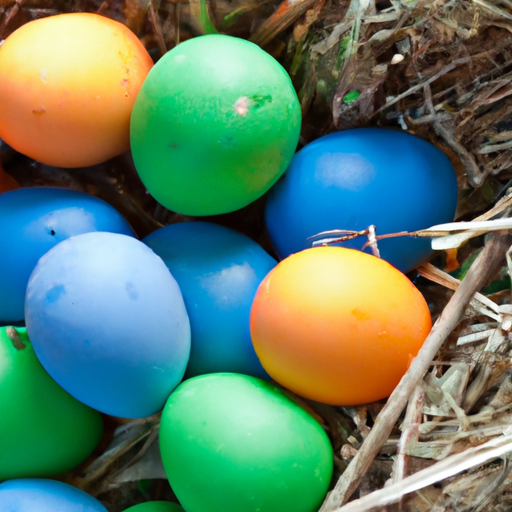As a brooding hen owner, you may be wondering if there are specific nutritional supplements recommended for your feathered friends. After all, ensuring the health and productivity of your hens is crucial for a successful brooding season. In this article, we will explore the importance of nutritional supplements for brooding hens and discuss some key recommendations to keep your hens in optimal condition. So, let’s dive into the world of brooding hens and discover the power of proper nutrition!
Importance of Nutritional Supplements for Brooding Hens
Understanding the Brooding Process
Brooding is a crucial stage in a hen’s life cycle, where she incubates her eggs and cares for the chicks until they can fend for themselves. During this period, the hen’s nutritional needs increase significantly as she expends energy to maintain body temperature, produce eggs, and provide proper nourishment to her growing offspring. To ensure the health and well-being of brooding hens and their chicks, it is essential to provide them with a balanced diet that meets their specific nutritional requirements.
Nutritional Needs During Brooding
Brooding hens have unique nutritional needs that differ from those of laying hens or roosters. During this phase, the hen’s diet should focus on providing adequate amounts of protein, vitamins, minerals, and other essential nutrients. These nutrients play a vital role in supporting the hen’s overall health, promoting proper egg development, and aiding in the formation and growth of strong and healthy chicks.
Benefits of Proper Nutrition for Brooding Hens
Providing brooding hens with proper nutrition through the use of nutritional supplements offers numerous benefits. Firstly, it helps support the hen’s overall immune function, ensuring that she remains healthy and capable of caring for her chicks. Secondly, adequate nutrition during brooding can improve the hen’s ability to produce nutrient-rich eggs, which are essential for the growth and development of the embryos inside. Lastly, proper nutrition can enhance the hen’s reproductive success and increase the likelihood of producing healthy and vibrant chicks.
Essential Vitamins for Brooding Hens
Vitamin A
Vitamin A is crucial for brooding hens as it plays a vital role in maintaining good vision, promoting healthy growth and development, and supporting optimal immune function. It is particularly important during brooding as it aids in embryo development and contributes to the overall health and vitality of the chicks.
Vitamin D
Vitamin D is essential for the absorption and utilization of calcium and phosphorus, which are vital for the development of strong bones and eggshell formation. During brooding, hens require sufficient vitamin D to ensure the proper development of their offspring’s skeletal system.
Vitamin E
Vitamin E acts as a potent antioxidant and plays a crucial role in protecting cells from oxidative damage. It is especially important during brooding, as it can help support the hen’s immune function and reduce the risk of chicks being born with deficiencies or health issues.
Vitamin K
Vitamin K is essential for proper blood clotting, preventing excessive bleeding during the brooding process and promoting the healthy development of the chicks.
B Vitamins
B vitamins play various roles in the hen’s body, including energy metabolism, nerve function, and growth. During brooding, hens may require additional B vitamins to sustain their elevated energy needs and promote the healthy development of their offspring.
Minerals Vital for Brooding Hens
Calcium
Calcium is a critical mineral for brooding hens as it is vital for eggshell formation, muscle function, and nerve signaling. During brooding, hens need sufficient calcium to ensure healthy egg development and support the growth and development of their chicks’ skeletal systems.
Phosphorus
Phosphorus is essential for bone and eggshell formation, energy metabolism, and proper cell function. Adequate phosphorus intake is crucial during brooding to support the hen’s own skeletal health and promote the healthy development of her chicks.
Magnesium
Magnesium plays a crucial role in numerous physiological processes, including energy metabolism, muscle function, and bone development. During brooding, hens require sufficient magnesium to support their own well-being and the healthy growth and development of their chicks.
Iron
Iron is necessary for the production of hemoglobin, the protein responsible for carrying oxygen throughout the body. Adequate iron intake is essential for brooding hens to ensure proper oxygenation of tissues and support the healthy development of their offspring.
Zinc
Zinc is involved in various biological processes, including immune function, protein synthesis, and wound healing. Supplementing brooding hens with zinc can help support their immune systems and promote the overall health of their chicks.
Manganese
Manganese is essential for the proper development and formation of bones and cartilage. Supplementing brooding hens with manganese can contribute to the healthy growth and development of their chicks’ skeletal systems.
Protein Supplements for Brooding Hens
Importance of Protein in Brooding
Protein is an essential nutrient for brooding hens as it serves as the building block for muscle development, egg production, and the growth and development of chicks. During the brooding process, hens have increased protein requirements to support their own bodily functions and provide the necessary nutrients for their offspring.
Recommended Protein Sources
There are various protein sources that can be incorporated into a brooding hen’s diet. Good sources of protein include soybean meal, fish meal, poultry by-product meal, and pea protein. Including a combination of these protein sources can help ensure a well-rounded amino acid profile to support the hen’s nutritional needs and promote the healthy growth and development of her chicks.
Considerations When Choosing Protein Supplements
When selecting protein supplements for brooding hens, it is important to consider the quality and digestibility of the protein source. Additionally, it is crucial to choose supplements that are free from contaminants, meet industry standards, and are sourced from reputable manufacturers.
Omega-3 Fatty Acids and Brooding Hens
Role of Omega-3 Fatty Acids
Omega-3 fatty acids play a critical role in the overall health and well-being of brooding hens and their chicks. They have been shown to support healthy brain development, improve immune function, and enhance the quality of eggs produced.
Sources of Omega-3 Fatty Acids
Omega-3 fatty acids can be obtained through the incorporation of specific feed ingredients such as flaxseed, chia seeds, fish oil, or algae into the brooding hen’s diet. These sources provide the necessary alpha-linolenic acid (ALA) and long-chain omega-3 fatty acids, such as eicosapentaenoic acid (EPA) and docosahexaenoic acid (DHA), which offer numerous health benefits.
Benefits of Omega-3 Supplementation
Supplementing brooding hens with omega-3 fatty acids can lead to several benefits. These include improved fertility and hatchability rates, enhanced egg quality, and the potential for the transfer of omega-3 fatty acids to the chicks, promoting their overall health and vitality.
Antioxidants for Brooding Hens
Understanding Oxidative Stress
Oxidative stress occurs when there is an imbalance between the production of harmful free radicals and the body’s ability to neutralize them. During brooding, hens may experience increased oxidative stress due to the high energy demands of egg production and chick rearing. This oxidative stress can lead to cellular damage if not properly addressed.
Common Antioxidant Supplements
Supplementing brooding hens with antioxidants can help combat oxidative stress and reduce the risk of cellular damage. Common antioxidant supplements include vitamin C, vitamin E, selenium, and various plant extracts rich in antioxidant compounds.
Significance of Antioxidants for Brooding Hens
Providing brooding hens with antioxidant supplements can have several benefits. Antioxidants help protect cells from damage, support immune function, and promote overall health and vitality. They also contribute to the healthy development of chicks and enhance their ability to withstand environmental stressors.
Probiotics and Gut Health in Brooding Hens
Importance of Gut Health
Maintaining a healthy gut is crucial for brooding hens as it directly influences their overall well-being and the health of their chicks. The gut microbiota plays a vital role in nutrient absorption, immune function, and defense against harmful pathogens.
Benefits of Probiotic Supplementation
Probiotics are beneficial bacteria that can help maintain a healthy gut microbiota in brooding hens. Supplementing brooding hens with probiotics can improve nutrient absorption, enhance immune function, and reduce the risk of digestive disorders during the brooding process.
Recommended Probiotic Strains
Various probiotic strains, such as Lactobacillus and Bifidobacterium, have been found to be effective in supporting gut health in brooding hens. When choosing a probiotic supplement, it is important to select strains that have been specifically studied and shown to offer benefits for poultry.
Herbs and Botanicals for Brooding Hens
Natural Remedies for Brooding Hens
In addition to standard nutritional supplements, herbs and botanicals can also play a role in supporting the health and well-being of brooding hens. Certain herbs and botanicals have been traditionally used and studied for their potential benefits in promoting optimal reproductive health, immune function, and stress reduction.
Effective Herbs and Botanicals
Some herbs and botanicals that have shown promise in supporting brooding hens include garlic, oregano, turmeric, and ginger. These natural remedies may offer antimicrobial properties, anti-inflammatory effects, and antioxidant protection, contributing to the improved health and vitality of brooding hens and their chicks.
Dosage and Administration
When incorporating herbs and botanicals into a brooding hen’s diet, it is important to follow recommended dosage guidelines. Additionally, consulting with a poultry nutritionist or veterinarian can provide valuable insights into the appropriate administration of these natural remedies, ensuring their safe and effective use.
Supplements to Boost Egg Quality
Promoting Better Egg Production
Supplements can play a crucial role in boosting egg production and quality in brooding hens. By providing the necessary nutrients, such as vitamins, minerals, and antioxidants, supplements can optimize egg development and promote healthy egg laying.
Enhancing Egg Shell Strength
Supplements rich in calcium, vitamin D, and other minerals can contribute to the formation of strong eggshells, reducing the risk of breakage and providing a safe environment for developing chicks.
Factors Affecting Egg Quality
Multiple factors can affect egg quality, including genetics, nutrition, and environmental conditions. By addressing these factors and providing appropriate supplements, brooding hens can lay eggs of exceptional quality, ensuring the vitality and health of their offspring.
Consulting a Poultry Nutritionist
Importance of Expert Advice
Consulting a poultry nutritionist is highly recommended when determining the appropriate nutritional supplements for brooding hens. These professionals have extensive knowledge and experience in poultry nutrition and can tailor a dietary plan to meet the specific needs of brooding hens, optimize their health, and promote the successful rearing of their chicks.
Professional Nutritional Assessment
A poultry nutritionist can conduct a comprehensive nutritional assessment of brooding hens, taking into account factors such as breed, age, reproductive status, and overall health. This assessment allows for the identification of any nutritional deficiencies or imbalances and the formulation of a targeted supplement plan to address them.
Customized Supplement Recommendations
Based on the nutritional assessment, a poultry nutritionist can provide customized supplement recommendations for brooding hens. These recommendations will take into account the hen’s specific needs and may include a combination of vitamins, minerals, protein sources, omega-3 fatty acids, antioxidants, probiotics, and herbal supplements. Following these recommendations will help ensure that brooding hens receive the necessary nutrients to support their health and the successful development of their offspring.
In conclusion, providing proper nutritional supplements to brooding hens is essential for ensuring their overall health, reproductive success, and the well-being of their chicks. By addressing their specific nutritional needs through the supplementation of vitamins, minerals, proteins, omega-3 fatty acids, antioxidants, probiotics, and herbal remedies, brooding hens can achieve optimal reproductive performance and raise healthy and vibrant chicks. Consulting a poultry nutritionist is highly recommended to develop a customized supplement plan tailored to the unique requirements of brooding hens, ultimately leading to successful brooding and a thriving flock.




